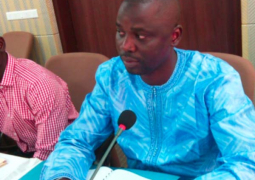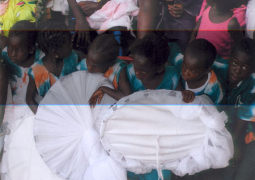It is evident that a profound change is underway in the world economy. The balance of economic and financial power is shifting from the West to the East. This shift could usher in a super-cycle of strong, sustained growth for those economies best-positioned to succeed. The successful countries will be those with financial clout or natural resources, or with the ability to adapt and change with the times.
The current crisis, triggered by a systemic failure of the financial system in the West and by an imbalanced world economy, is a sign of this global shift.
In light of the above, the Point yesterday caught up with Mr. Musa Bassadi Jawara, a renown Gambian economists to shed light on economic developments in the context of national development. Please read on:
Point: Mr. Musa Bassadi Jawara, welcome to the Point News Paper.
Mr. Jawara: It's a pleasure having me
Point: Can you shed light on economic development in the context of national development?
Mr. Jawara: Achieving independence and ending civil war and other threats to government stability are only the first step toward a political environment that is conducive to economic development. Raising the general standard of living is the goal of development, but countries diverge on the best methods of achieving this goal. Historically, the growth of the now developed nations was accompanied by a shift from agricultural into industrial activities.
Point: You sit on the Executive Board of the Abundance Fund (AF), headquartered in San Francisco, California, and its point man for West Africa. Can you tell us your activities in The Gambia?
Mr. Jawara: You will recall in the Fall of 2008, through this news paper, acting under the directives of the board of directors, I issued a request for proposal (RFP) inviting Gambian individuals and NGOs to submit project proposals for funding by AF. Let me say that the response was overwhelming from The Gambia. Four projects were earmarked for immediate funding, three goes to The Gambia and Namibia received the forth one. The Gambian projects are: Model Farm for Sustainable Agriculture, Beekeeping for Prosperity, and Irrigation to Feed Children. Financing phase of these projects is now underway.
Point: What is the end game with these projects and how is progress measured?
Mr. Jawara: Our objective, putting it in battle field terminology, is to wage a grassroots conventional warfare on poverty with unconventional weaponry. By so doing, we are determined to defeating this social menace, poverty, by employing new techniques that have hitherto not been experimented with. See my friend for too long, the Breton Wood institutions and Western development agencies with duplicity and sanctimonious arrogance toward Africa, contributed immensely to the impoverishment of the continent. There must be a new thinking and new economic paradigm to be fashioned out to reverse the current disturbing trends on poverty.... Our efforts must be inculcated in and facilitated by our resolve, allow intended resources in this campaign to metastasize to the very segment of society who needed them most.
Point: You are sounding some what Pan African...?
Mr. Jawara: Yes indeed.... African countries, governments in particular, must now exert a little bid of independence from World Bank for example, and adopt Colonel Muammar Gaddafi, the Libyan leader's call for integrated efforts to deal with Africa's development agenda. Colonel Muammar Gaddafi, despite all of his alleged peccadilloes, thanks to the mischievous propaganda waged against him by the Western press, succeeded mightily, in transforming Libya into a modern state. I have been sojourned in Libya for some time now and witnessed these developments first hand. I may sound pedantic and parochial with this idea; African Union should consider extending his term as chairman, when it expires next year. There is no one who knows himself and can describe himself with fidelity than Muammar Gaddafi, Africa could not have asked for a better spokesman!
Point: Any thoughts or ideas about the overall development process in The Gambia?
Mr. Jawara: To be very honest with you, if we peel away the political rhetoric and misconceptions: there is significant development taking place at the individual level, private sector level and at the public sector in The Gambia. Let me cite few projects, in my opinion, when completed will be a mammoth step forward in The Gambia's development agenda: the massive construction efforts in road network, rural electrification initiative, emphasis on investment in agriculture with a view to attaining food self-sufficiency, the robust commercial activities in the private sector and not to ignore the health sector... among others. All these development initiatives must be administered and anchored by sound macro-economic management, which has been in placed for some time now. So, all in all, I'm encouraged by development activities in The Gambia.
Point: Your approach bespeaks patriotism and ones love for country, critics of this government may sound some what different from you, and what message do you send them?
Mr. Jawara: Dissension, freedom of speech and the right of the governed to agree or disagree is sine quo non to the proper functioning of a flourishing democracy. However, absolutely disagree with some of the critics of this government in that using the Internet as a staging ground, for ad hominem attacks directed at the regime on daily basis, is unwarranted and senseless. Everyone is entitled to their views and believes in a free society and, not only do I respect this premise, I support it. But, we must not allow our opposition to the state of affairs in our country... festers and degenerate into slander and calumny, this stoops to the very bottom of gutter journalism. And not helpful at all! I fervently believe that there are better ways in the doctrine of rapprochement and we must explore them.
Point: Thank you Mr. Jawara.
Mr. Jawara: No problem... It's a pleasure.



